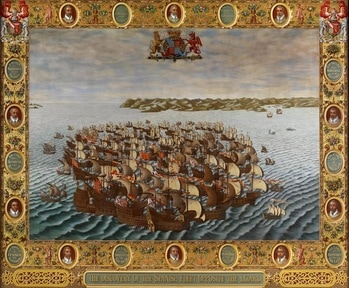Trapped in Plymouth Harbour by the incoming tide, the English fleet could do nothing about this threat.
Eventually, with the turning of the tide, fifty-five English ships set sail, with Charles Howard as Admiral of the Fleet, and Francis Drake as his Vice Admiral.
On the evening of the 19th of July Howard wrote to Thomas Walsingham :
"whereupon, although the wind was very scant, we first warped out of harbour that night, and upon Saturday turned out very hardly, the wind being at South-West; and about three of the clock in the afternoon, descried the Spanish fleet, and did what
we could to work for the wind, which [by this] morning we had recovered, descrying their f[leet to] consist of 120 sail, whereof there are 4 g[alleasses] and many ships of great burden. At nine of the [clock] we gave them fight, which continued until one.
[In this] fight we made some of them to bear room to stop their leaks; notwithstanding we durst not adventure to put in
among them, their fleet being so strong. But there shall be nothing either neglected or unhazarded, that may work their overthrow. Sir, the captains in her Majesty's ships have behaved themselves most bravely and like men."
Charles Howard's, along with John Hawkin's and Martin Frobisher's part in this great historical moment are often forgotten, and in the story of the Spanish Armada, they rarely get a mention. It was Howard along with Drake who thought of and organised
the famous fire ships that burnt and finally destroyed the Spanish ships, yet it is Francis Drake who usually gets all the credit.
Drake, all cool, calm and collected, and handsome to boot, fits our romantic ideals as the perfect hero and what better story to demonstrate this is his famous game of bowls on Plymouth Hoe. On being told that Spanish ships had been spotted he famously remarked that there was plenty of time for him to finish his game.
Now, that is cool if he actually said it!



 RSS Feed
RSS Feed
